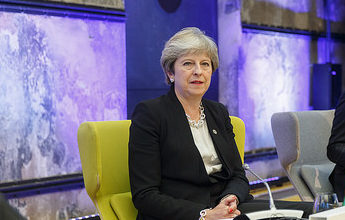Prime Minister Theresa May hit back at her critics over the weekend, telling them: ‘Getting rid of me won’t make a Brexit deal any easier.’
She called for unity in what she said was a ‘crucial’ week for the country as her proposed withdrawal agreement with the EU came under renewed fire from all sides.
Mrs May told Sky’s Ridge on Sunday that it had been a ‘tough week’ but that she would continue to work to secure an exit deal with the EU.
Her negotiators are expected to thrash out more details of the UK’s future relationship with the EU in the next few days and Mrs May says this may calm some of her opponents’ fears.
This will be followed by a summit of EU leaders next week to ratify the agreement and a crunch vote on the deal in Parliament, possibly in the New Year.
But criticism of her proposed deal continued to pour in over the weekend, with her former Brexit Secretary Dominic Raab claiming the EU was bullying the UK into a deal.
Raab, who quit his post last week, told the BBC’s Andrew Marr Show: “I do think we are being bullied, I think we are being subjected to what is pretty close to blackmail frankly.”
Labour leader Jeremy Corbyn told Ridge on Sunday that his party could secure a better deal in time for the March 29 deadline for the UK to exit the EU.
But he told interviewer Sophy Ridge that he ‘did not know’ how he would vote if there was a second referendum, or ‘People’s Vote.’
With Tory rebels submitting letters calling for a confidence vote that could topple her, Mrs May told Ridge that it would not solve anything.
She said: “It is not going to make the negotiations any easier and it won’t change the parliamentary arithmetic.”
If Sir Graham Brady, chairman of the Conservative backbench 1922 committee, receives 48 letters from MPs, that would trigger a confidence vote.
A number of ministers resigned last week when details of the 585-page withdrawal agreement were released but Mrs May said talks about key details were continuing.
Tory Brexiteers responded at the weekend with a rebuttal document outlining their objections and claiming the UK will be a ‘rule taker’ with no voting rights.
Members of Mrs May’s cabinet are also reported to have met at the weekend to ‘re-write’ the deal and seek more concessions from the EU.
But EU leaders – including German Chancellor Angela Merkel – have already made clear that it is not up for renegotiation.
The European Commission has offered an extension to the transition period for the UK to leave, proposing December 31, 2022 as the end date.
Labour, the SNP in Scotland and the DUP in Northern Ireland have all said they will vote against Mrs May’s Brexit deal when it comes before Parliament.
With many MPs in her own party also vowing to vote it down, there is little chance of it passing if they all stick to their guns.




